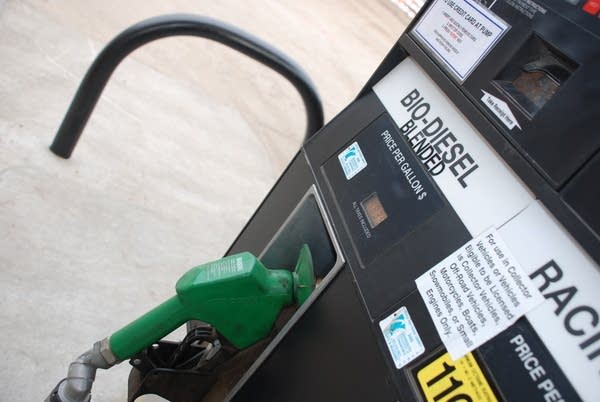Minnesota doubles biofuel mandate for diesel

Next May, biofuels in Minnesota will need to contain a mix of 20 percent soybeans or other renewable sources under a new mandate.
State officials say the so-called B20 mandate will cut carbon dioxide emissions by 1 million tons next year, while providing an economic boost to farmers and three Minnesota companies that produce the plant- or animal fat-based oils for use in the diesel fuel blends.
"This is an opportunity to add value to farmers' products," state agriculture commissioner Dave Frederickson said Thursday at Farmfest. "Given the fact that the first B10 mandate actually added about 63 cents per bushel, on every bushel sold. We're hoping to double that as we move into a B20 mandate."
An additional $0.63 per bushel would mean roughly an extra $200 million in total revenue for state farmers. And that would be a big help, because farm country is struggling. Soybean prices are below the cost of production for many producers.
Create a More Connected Minnesota
MPR News is your trusted resource for the news you need. With your support, MPR News brings accessible, courageous journalism and authentic conversation to everyone - free of paywalls and barriers. Your gift makes a difference.
In 2005, Minnesota became the first state in the nation to mandate biodiesel — a blend containing 2 percent soybean oil. The most recent mandate required 10 percent renewable sources.
The mandates' goal to increase demand for commodities and promote use of a product that generates less air pollution.
Under the new mandate, state officials projects particulate emissions will decline by 130 tons.
Robert Moffitt of the American Lung Association in Minnesota welcomed the new standard.
"Vehicle emissions are the single largest source of air pollution in the state of Minnesota," he said. "Anything we can do to help reduce those is a good thing for lung health. And biodiesel certainly fits that bill."
But trucking and petroleum interests object to the change. Last month, seven organizations wrote to state officials objecting to the pending introduction of B20, saying hey were extremely concerned about the mandate. The groups included the Minnesota Trucking Association, Flint Hills Resources, the Minnesota Petroleum Council, and the Alliance of Automobile Manufacturers.
"Our understanding is that the infrastructure has not been updated in big parts of the system," said John Hausladen of the Minnesota Trucking Association. "That could really slow down the off-loading to trucks."
Agriculture commissioner Dave Frederickson said the state has looked at the infrastructure issue, and decided that the fuels industry has in place what's needed to mix and deliver B20.
In any case, the new mandate only applies during summer months. During the winter the state requires only a 5 percent blend.
All diesel fuels turn from fluid to gel in colder temperatures, and that leads to all sorts of problems, like clogged fuel lines or filters. The 20 percent biodiesel blend will gel in warmer temperatures than petroleum. Even now, the 10 percent blend is sold only during the warm weather months, from April through the end of September.